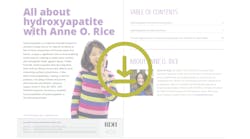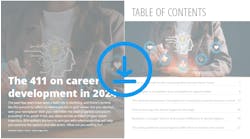soaking wet
by Cathleen Terhune Alty, RDH
The reality of getting older often hits when we least expect it. Yes, the age number creeps higher each year, but the true reality of being older can smack like the business end of a baseball bat. Ouch! Which hill was it that put me "over the hill"? Suddenly more sage than vixen, a been-there-done-that in a land of the new and now, a road-weary skeptic when promised more, better, and thinner! Maybe what's worse is the question, "Is this all there is?"
For those of us who have been prophy paste flingers for longer than we ever imagined, we could ask the same questions of our dental hygiene career – what exactly did we expect? How do we keep up? And why, for so many, has it been such a disappointment? Having sharpened scalers from sea to shining sea for over 30 years, I have faced many temptations to hang up the scaler for good and move on to a career that seemed somehow more deserving of all that education. But here I am, sharpening stone in hand, still honing my dental hygiene skills.
I think all hygienists struggle at some time or another to stay excited about the profession. When it's the same old battles of RDH vs. DDS, supply vs. demand, or fee for service vs. corporate dentistry with no noticeable progress, it's easy to lose sight of the simple truth that only we can control our attitude. Schools will continue pumping out new graduates, which will cause the demand pendulum to swing back on the supply side and put hygiene job security on high alert.
How will you distinguish yourself from every other person with a hygiene resume? I believe a great passion is at the very core of every satisfied, confident, outstanding dental hygienist. Keeping the passion alive after 15, 20, 25 or more years requires more than a paycheck, as well as a greater skill set than perfecting a saliva ejector twist. Regardless of your age, if you're in this career for the long haul, what is your plan for staying passionate?
Passion is much more than a feeling and more than a motivation; it is a commitment. Remember the beginning and what brought you here. For most of us, a desire to help people was number one. Some of us wanted to be in health care without the life and death drama of nursing. Maybe it was to earn a good income with part-time hours. Whatever your reasons, you wanted it badly enough to press on through the grueling coursework and graduate.
What you didn't recognize then is that you possessed only the basic skills to get by. Your potential to be a true professional came only with experience and additional education. If demanding to be called and paid as a professional, where does your education level need to be to back up that claim? What is keeping you from pushing forward?
We know we are doing so much more than cleaning teeth. We learn the psychology of the whole patient through hands-on, physical interaction. We are literally in their face in a way that few other health-care providers experience. We can heal tissue with our hands. We possess a special knowledge few people outside of dentistry understand. We know more than we can share. If a profession is found in its desire for greater excellence than the day before, then we can always find better ways to do our job.
Any Katie Curette can spout her state's CE requirement. But the good ones don't ever scramble for CE hours because they exceed them, year in and year out. CE requirements are the minimum requirements to keep one's license. How is doing the minimum an attribute of any professional? In today's economy, how can the minimum of anything keep someone employed? Your educational level needs to be rising. Lifelong learning is the hallmark of any professional. CE makes you more productive, up to date, and competitive in the workforce. We need a sense of urgency to move forward on professional development and self-improvement. A valuable employee is still replaceable, but is usually not the first head on the chopping block. Find relevant CE courses and unique ways to implement the information into practice. The more you know, the more valuable you become to yourself and your present (or future) employer.
Changing technologies require sophisticated skills and frequent training. Technical information, including health care research, is increasing and surging forward at unprecedented speed. In 2008, it was estimated that our technical information doubled every two years. For a person pursuing a four-year degree, half of what that person learned in his or her first year was obsolete by the third year of study. How can anyone claim to be on top of the profession without continual study and training? It's no wonder many states are increasing required CE for dental professionals.
Experts say people will have five careers during an average work life. How does that relate to your hygiene career? Specialized knowledge brings greater skills, confidence, value, and job potential. Today's children are being trained for jobs that don't exist, using technologies that have yet to be invented, to solve problems we don't know we have. Will there still be teeth that need tending? I believe so. Prepare yourself for the dental career of the future by staying on top of health care research. Attend meetings, ask questions, and think about the big picture. How will dentistry change in the next 10 years and how will you contribute? Don't be content to sit in the audience when we need to be on stage. Buckminster Fuller said it best: "We are called to be architects of the future, not victims." Stop playing the victim card and find ways to have your voice heard. Don't complain – be the change.
In addition to the purely technical information, try improving your oral and written communication skills. Read and read some more. Brian Tracy, self improvement expert and author of "Time Power" says, "Read at least one hour per day in your chosen field. One hour a day will translate into approximately one book per week. One book per week will translate into approximately 50 books over the next 12 months. If you read an hour per day, one book per week, you will be an expert in your field within three years. You will be a national authority in five years, and you will be an international authority in seven years. All leaders are readers."
The more you read, the more you will have to discuss and share, which enriches patients and coworkers. Having a multifaceted knowledge of how the working world works will help with patient rapport. Know more than rumor or unconfirmed report. Find the source and research it for yourself. Before search engines like Google, finding information was a challenge. Now there is no excuse.
Next, work on your writing skills. There is always a better way to write patient notes in a more comprehensive, cohesive manner, and the bonus is it may just save you in court. Contribute your personal research in dental hygiene publications or Web sites. Share what you see with others in the field, encouraging and staying positive. For those of us who will be retiring in the near future, encourage the next generation to achieve an even higher level of expertise.
Is the career not bringing you joy? Maybe what's missing is a lack of giving. There's an old saying that says people are happiest when they give more, not get more. When is the last time you donated your dental hygiene skills? There are screenings, free dental clinics, and other events that beg for dental volunteers. If you can't find one, start your own. Staying fresh and excited may be just a volunteer position away.
Older doesn't necessarily mean wiser, nor does it mean permanent immunity from the shine and sparkles. But we've seen enough to know that if passion for the profession and not the paycheck is our driving force, and lifelong learning is a regular habit, we will find a satisfying career that makes us dignified professionals ready for whatever challenges the future delivers.
Tips for being a great hygienist
- Commit yourself to being an excellent hygienist today. Then make your actions match the commitment.
- Be an encourager.
- Understand the problems that face the profession – oversupply, dentists who don't get it, burnout, etc., – but don't let the problems distract you from achieving your own personal excellence.
- Every situation is a learning situation, especially the bad ones.
- Practice optimism until you stop breathing!
- Develop your intellectual abilities and promote what you know and how well you know it.
- Keep your eye on the big picture
- Don't take guilt trips – even your GPS can't get you home from one.
- Surround yourself with people you love. Relationships are everything.
Cathleen Terhune Alty, RDH, is a frequent contributor who is based in King George, Va.
Past RDH Issues







